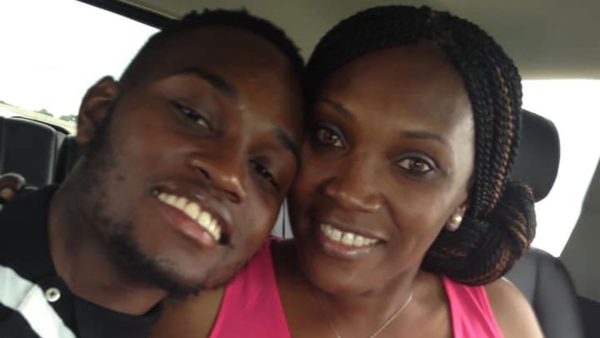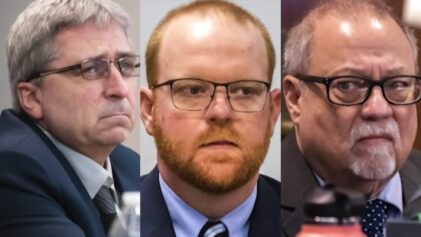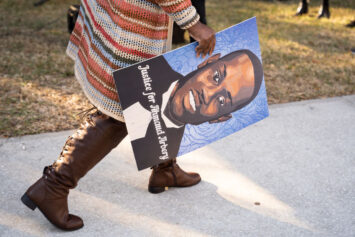A week after the federal hate crime trial of the three men convicted of murdering Ahmaud Arbery, a Black man killed while jogging in a predominantly white community in Brunswick, Georgia, players in the case are speaking out about their observations surrounding the case.

Marcus Ransom, a Black man who served as the foreman of the jury for the federal hate crime trial, said he saw video showing father and son Gregory and Travis McMichael kill Arbery and recalls being shocked by the violence.
Ransom, also known as Juror No. 150, was the only Black man selected to serve on the jury and believed that because of his upbringing he would not allow any bias to influence his judgment. When the first trial started, he had not paid a lot of attention to it because he was bereaved, dealing with the death of his grandmother.
Once he was named as a juror on the federal case for the McMichaels and William “Roddie” Bryan, Ransom said that he was prayerful about the assignment. “I just prayed for everyone: For the jury. For Ahmaud’s family. Even the defendants.”
Though he prayed for the defendants, once he was made privy to the character of the three men, he was moved to tears.
Ransom said he cried when the prosecution showed the court a video that Travis McMichael posted on social media that ridiculed a young Black boy dancing.
He said he was disturbed hearing and reading the text messages where racial epithets were used. And he said he also cried when he watched police body camera footage of Arbery after the shooting. The man said he got emotional watching Arbery gasp for air and twitch on the ground as he bled from his wounds.
This led Ransom to believe that the three men not only had hatred for Arbery but Black people as a whole.
“Just seeing that it was so much hatred that they had, not only for Ahmaud but to other people of the Black race,” he said. “It was a lot to take in.”
Also difficult to take in was the level of indifference that Travis and Gregory McMichael demonstrated as they watched Arbery die on a street in the neighborhood of Satilla Shores, and Bryan’s flip-flop position on his participation in the crime.
Ransom was shocked that Bryan actually chased Arbery, only retreating before the last moments of his death, and videotaped the murder as if he were just a bystander. Moreover, the juror was shocked at Bryan’s audacity to tell police that he hadn’t seen the man before and had no clue why he was being chased.
Arbery’s father, Marcus Arbery Sr., said he could tell that the evidence presented during the trial was starting to get to Ransom.
“Ahmaud was a Black man, I am a Black man, that juror was a Black man. We move through the world the same in a lot of ways,” Arbery said. “Because Ahmaud was Black and he is Black, he probably knows that this could have been him. He probably said to himself, ‘This could have been me.’”
The 35-year-old social worker said he has no idea why he was selected to be the foreman for the jury.
He said the deliberations went smoothly with no arguing about the innocence of the men on trial. Ransom also stated that none of the jury “strongly disagreed” that Arbery was pursued and killed because of his race, making it easy — jurors deliberated for less than four hours — to convict them of the hate crime.
“Wrong is wrong and right is right,” he said. “No matter what it is, you’ve got to have consequences. No one is above laws.”
Others commenting on the case include defense lawyers, who said that while they stood by their clients, they had some issues with some of the statements of their co-counsel.
Bob Rubin, who represented Travis McMichael during the state murder trial against the three men, was unhappy when defense attorney Kevin Gough, who represented Bryan, infamously said, “We don’t want any more Black pastors coming in here.”
“If we could have slapped a piece of duct tape on Kevin’s mouth at that moment, we would have,” Rubin admitted.
“It was extremely unfortunate and just created more problems than anything that was happening before that,” he said. “The art of lawyering is the art of speaking. I don’t know why he was not better at doing his job that way. It was frustrating.”
He noted that he understood why he said it. Civil rights leaders Revs. Jesse Jackson and Al Sharpton had been present during the trial and Gough’s thinking was that they could have swayed the jury.
Rubin defended Laura Hogue, the defense attorney who represented Greg McMichael, for saying during closing arguments that Arbery’s toenails were “long” and “dirty.”
He said she was trying to communicate without saying that he had mental health issues, but did it in a roundabout way because the defense couldn’t present evidence of Arbery’s health status.
The goal for the defense was to to show that Arbery was shifting from the image of the person “with the big smile, beautiful face photograph that the state used in the trial,” Rubin said before insisting that Hogue is “the most progressive, loveliest, well-meaning person on the planet.”
He also wanted to dismiss the idea that she was a bigot sending out a dog whistle to potentially racist jurors.
“We didn’t have racist jurors. None of us had any reason to believe that any of the jurors would be responsive to a dog whistle. … She did not have any bad motive at all or racist motive in making that argument.”
Following the conviction in the federal hate crime case, Attorney General Merrick B. Garland spoke on federal intervention in cases of violence and intimidation at the hands of white supremacists.
“After the civil war, during Reconstruction, the Justice Department was tasked with bringing to justice those who use terror and violence to prevent Black Americans from exercising their civil rights,” Garland said. “The white supremacists who carried out those acts assumed that they could operate outside the bounds of the law.”
He continued, “No one in this country should have to fear the threat of hate-fueled violence no one should fear being attacked or threatened because of what they look like, where they are from, whom they love or how they worship. And no one should fear that if they go out for a run they will be targeted and killed because of the color of their skin.”
Georgia state court sentenced all three men to life in prison in the murder case, with no chance of parole for the two McMichael men. The world is waiting for U.S. District Court Judge Lisa Godbey Wood to schedule a sentencing date for the federal case.
She has the option of sentencing all three defendants to life sentences for their hate crime convictions.
More news from our partners:

